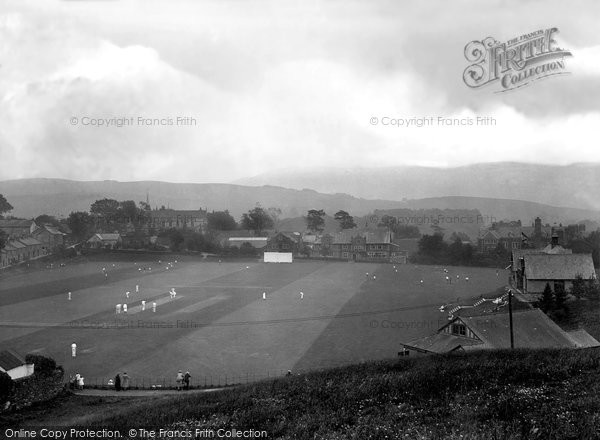=6. SEPTEMDECILLION (Hypperson, 2004, USA)
=6. BIERCE THE FIERCE (Guillermo del Toro, 2006, Esp/US/Mex)

http://fictionalfilmclub.blogspot.com/2008/11/bierce-fierce-guillermo-del-toro-2006.html
'If James Cameron is the King of the World, Hypperson is the Booze in the Cooking' Keith Floyd
'[Bierce the Fierce]... is a festival, a torrid dance, a gorgeous musical death...' LA Weekly
I've written about these two at length, and couldn't split them. Both equally as good as one another in almost every way. Both haunt the back of my eyelids perennially.
5. NUEVA GERMANIA (Soren Elkjaer, 2004, Den/Ger/UK)

'No-one will ever place my words inside quotation marks.' Soren Elkjaer
Dane Soren Elkjaer has to date served up a buffet (writers: the word 'smorgasbord' is not necessitated every time a Scandanavian offers a selection of anything) of filmic wonder. Any selection might have warranted a place here. Mehr Nicht, Mehr Licht (2000) focussed on the argument about Goethe's last words. Shortly after his death, a man in Augsburg in Germany was committed to an asylum for pronouncing loudly that he really said 'Mehr Nicht' (No More') rather than the attributed 'Mehr Licht' ('More Light'), a nihilistic wail rather than the more palatable invocation, instruction, last wish, or affirmation of something. The Doctor who committed the claimant him was honoured by the city.
Or we could have picked Elkjaer's Either, OR (2006) (synopisis: Soren Kierkegaard arrives by train in the small Oregon town of Either in 1854. At 41, his health is failing. He will die within the year. He has left a doppelganger in Europe who he instructs to live a hedonistic existence. His own plan is to write alone in the distant and lonely West, in a bid to carry out the ethical half of his own Either/Or theses. But when he gets drawn into a love triangle with a widow and her daughter, this may prove more difficult than he suspected...). Or Noah's Archimedes (2001) (The Biblical boatmaker meets the Greek philosopher. Both teach each other about bouyancy, etc.), or even his spellbindingly abstract biopic Agassi (2009), starring Isabelle Huppert as the leonine racket-swinger.
But Nueva Germania may be the best: Missionary of all things German Bernhard Forster (Bruno Ganz), along with his wife Elizabeth Bernhard-Nietzche (sister of Fred, here played by Tilda Swinton) set out for Paraguay in 1887 to start a new colony and prove the supremacy of the Aryan peoples far away from the Jews. The group struggles. A failure, Forster poisons himself in 1889. Elizabeth returns home in 1893 to look after her sick brother.
During the last portion of the film, after Forster has committed suicide and the dwindling band of ex-pats are drifting in a sick sea of madness, every line of dialogue is one that has been attributed as the last words of someone famous. The jungle rejects them, her harshness forces them out. 'Friends applaud, the comedy is finished' they say, 'drink to me! Moose, Indian, moose indian...'
4: SOME EMPTY CHAIRS IN NEED OF FILLING, OR: PURGATORY (Mickey Gilbert, 2009, Ire)

When Sean O'Flanahan's play about the celebrity afterlife won a TONY in 2005, and it was announced that a film version was to be made by Warner Brothers, no-one could have envisioned this. The original play imagined Aldous Huxley, CS Lewis and JFK (who died on the same day in 1963) awaiting judgment in a grey lounge in the afterlife. They talk about Jean Cocteau and Edith Piaf, who had died on the same day a month earlier. They talk about Gandhi and Orville Wright, who had died on the same day in 1948. The film was to be a sober reenactment of the play, with the same cast.
When Ingmar Bergman and Michaelangelo Antonioni died on the same day in 2007, O'Flanahan updated the play at the last minute, the actors improvising a touching for-one-night-only acknowledgement of the directors by impersonating them in Heaven. 'I realised that this play could run forever on the fumes of such tributes,' O'Flanahan said later, and when his friend Anthony Minghella and hero Arthur C. Clarke died on the same day in 2008, his cast repeated the trick. The proposed director of the film, Mickey Gilbert, thought that the excitement caused by these spontaneous rewritings lent the project new drama: 'In Spring 2009, we had begun shooting the original Huxley/Lewis/Kennedy script. I loved it, but as a film, something wasn't there. Something topical.'
Something soon came along.
On June 25, 2009, Michael Jackson, Farrah Fawcett and Sky Saxon died. Gilbert quickly halted shooting, and reshot the film with his actors impersonating these three. No dialogue was changed: 'Instead of Kennedy worrying about his legacy, we had Fawcett. Instead of Lewis calming the others with warm Christian philosophies and fantasy stories, we had Jackson. We shot it in three weeks, and had it out by November.'
3. GESTERN IST NICHT DORT (Dieter Buchmann, 2001, Ger)
http://fictionalfilmclub.blogspot.com/2009/01/gestern-ist-nicht-dort-yesterday-isnt.html
I've written about this previously too, and it only continues to rise in my estimation. Buchmann's other great achievement was his thirty-two hour Unity (2006), A real-time imagining of Unity Mitford's first meetings with Hitler in Berlin in 1934, when she learned his routine so she could 'accidentally' meet him in his favourite cafe. 'Before Sunrise meets Birth of A Nation' quipped Tarantino, Quentin, CA. ''Tasteless as turkey,' said Tarantino, Betsy, FL.
2. FIN (Michael Haneke, 2009, Aut/Fra)

'Haneke's moral diction is the glue of contemporary European cinema. His existence means I can be consoled by the failure of everybody else to show us burning bodies of war victims in every film since the invention of a medium for which 'medium' is an apposite word; Medium in the sense of divining ontological informations, and medium in the sense of being very average and unspectacular. How it should be, if you will, and how it is.' Tobias Hirsch
The last film to be released on the list, ducking snugly under the tape to be the one of the best as well. A couple middle-class couple finally have a great weekend together away from lots of family business. They feel guilty at first, but then loosen up, as they deserve some fun. They then turn on the news after a great forty-eight hours in blissful solitude to discover the world is about to end. Fin. No explosive apocalypse, just the certainty that everyone will die. The couple, most of all, feel guilty for their lovely last weekend. A suggestion floats that their internal relaxation somehow is linked to this chain of events; as if, by taking their eye off the ball, it has slipped under a passing car. This idea is very much a product of a modern egocentric and workaholic mindset, and is ruthlessly skewered by Haneke.
'We mock their bourgeois ways, we laugh at their pretensions, and we warm to their companionship. Ultimately, the horror and comfort comes from exactly the same place: Haneke is telling us how small we are, and how insignificant our worries are.' Sight & Sound
'The apocalypse, when it comes, will be inconsiderate. It will wait until just before your annual two-week holiday before descending blackly, leaving you rueing that fortnight you might have used more thoughtfully had you known. People of course, won't believe it. Won't want to. Will find it inconvenient, something to be spent away, ignored, etc. It will not be concerned with our society.' Michael Haneke

























